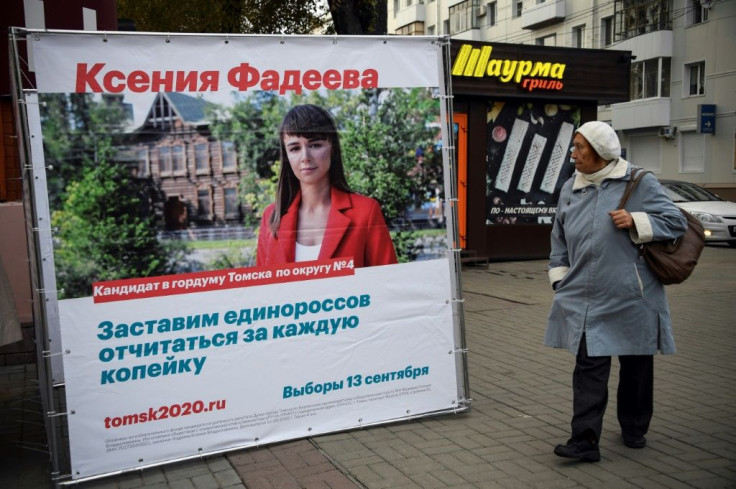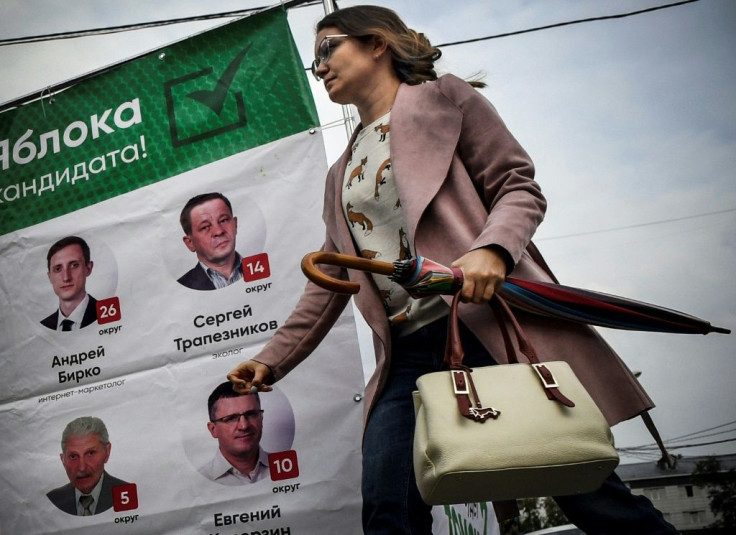In Siberia, Hopes For A Political Awakening Over Navalny Poisoning

Yelena Basova at first was not convinced that Russian opposition figure Alexei Navalny could have been poisoned in her hometown in Siberia.
Then she watched his investigation into local corruption.
"Everything became clear," the 33-year-old saleswoman said as she walked the streets of Tomsk, one of the oldest towns in Siberia and more than 3,000 kilometres (1,865 miles) east of Moscow.
"He was poisoned because he is fighting for the truth," Basova told AFP. Now, she said, she planned to support Navalny's movement in a municipal vote on Sunday.
Tomsk, a university town famed for its traditional wooden houses, is one of dozens of Russian regions, cities and towns voting in local elections on September 13.
It is also where supporters of Navalny, the most high-profile critic of President Vladimir Putin, claim he was poisoned last month because of his political activities.
The veteran anti-corruption crusader is recovering after being evacuated to Germany, where investigators say they discovered he was afflicted with Novichok, a military-grade nerve agent.
The Kremlin denies any involvement, saying it has yet to see proof of Navalny's poisoning and that doctors who tested him in Siberia found no traces of a poisonous substance.
Navalny was in Tomsk before he suddenly fell ill on a flight that had to make an emergency landing. Aides say they believe a cup of tea he drank at the city's airport may have been spiked.

He had been completing a Siberian tour in support of local candidates in the regional vote and the filming of two of his famed investigations into corruption among Russia's elite.
His probe in Tomsk alleged that members of United Russia, the ruling party set up by the Kremlin, had awarded public contracts to companies secretly controlled by party officials. Authorities denied the claim.
Ksenia Fadeyeva, the head of Navalny's Tomsk headquarters, was one of the last people to see him before he boarded the plane meant to take him back to Moscow.
"After the poisoning, I was in shock for two days," said the 28-year-old city council candidate, one of two Navalny allies running in the Tomsk elections.
Fadeyeva said she expects the investigation and Navalny's alleged poisoning to boost support for her candidacy, saying local authorities are starting "really to worry".

Navalny and his supporters have been effectively banned from national politics -- he was barred from standing against Putin in a 2018 presidential vote -- and he has been focusing his political efforts on regional campaigns.
As well as presenting its own candidates, his movement has promoted a "Smart Voting" strategy, calling on voters to support candidates most likely to defeat the ruling party.
The tactic saw Kremlin-backed lawmakers lose their majority on Moscow city council in last year's regional elections.
Fadeyeva said the authorities had countered by doing little to promote participation in regional elections.
So she has been hitting the streets to meet with voters after campaign meetings were barred because of coronavirus restrictions.
On a recent day in Tomsk some wished her luck, but others showed little interest.
"There is not a lot of talk about these elections," said Tomsk resident Alexander Lunev, a 37-year-old businessman. "A lot of people don't understand what these elections are for."
Mitya Nemtsev, a volunteer for the Navalny movement's campaign, said its biggest battle is against apathy.
"People have been instilled with the thought that they are powerless," said the 30-year-old tattooed activist.
"There is this idea that politics is something dirty.
"But it's wrong," said Nemtsev. "Local officials can sort things out, like in Khabarovsk."
The city in Russia's Far East has been held up as a rare example of defiance to Moscow after two months of protests -- in some cases involving tens of thousands of people -- against the arrest of a local governor who defeated a United Russia candidate.
But even in Siberia, where there is often resentment and distrust of authorities far away in Moscow, few expect the opposition campaign to make much headway in a system dominated by Putin's allies.
"In Tomsk, there are a lot of descendants of people who were deported or shot" during the tsarist and Soviet eras, said Viktor Muchnik, editor-in-chief of TV2, a local pro-opposition media outlet.
"This plays a role in our relationship with Moscow," he said. "But I wouldn't say the opposition's chances are good."
© Copyright AFP {{Year}}. All rights reserved.





















